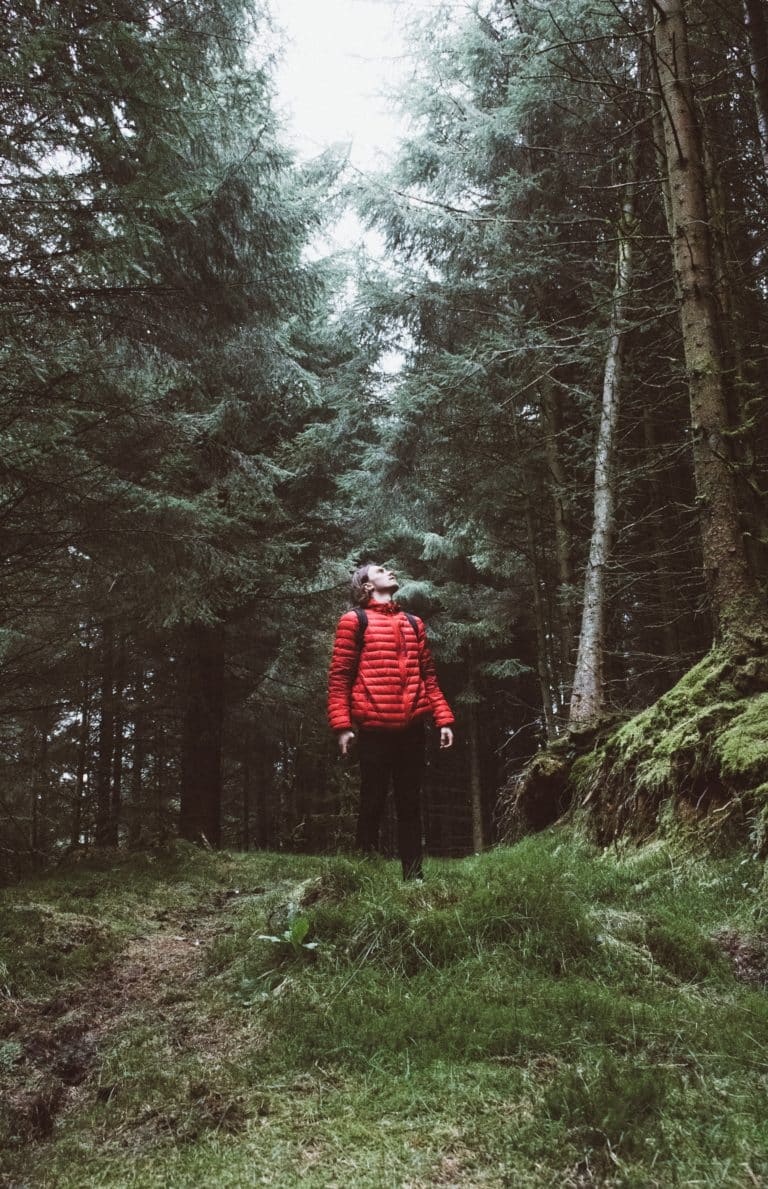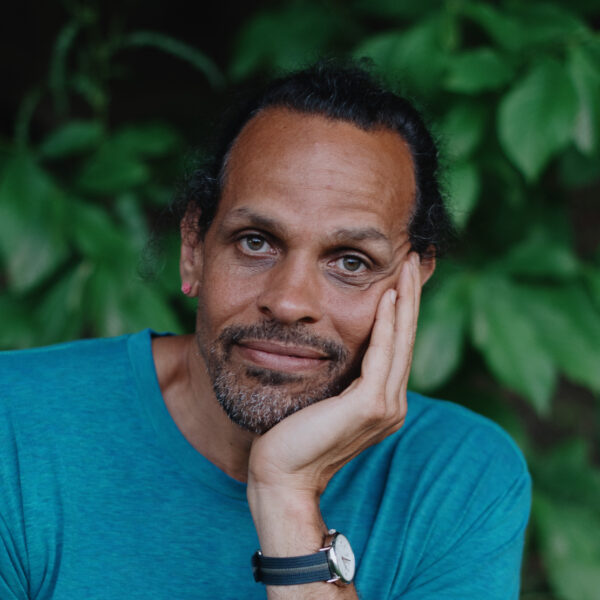
Image by Luke Ellis-Craven/Unsplash, Public Domain Dedication (CC0).
“Joy Is Such a Human Madness”
Editor’s note: The audio above begins midway through the essay.
So writes Zadie Smith toward the end of her beautiful essay “Joy.” She gets there by explaining that she has an almost constitutional proclivity toward being pleased. She is a delight to cook for, she suggests, because your pancakes will be the best pancakes she has ever eaten! And she has what I consider the wonderful quality—doubly, triply, wonderful in the almost prosecutorially vain and Hollywood-obsessed (or whatever’s the new Hollywood) culture of ours—of finding interesting faces beautiful. I love that. Something crooked or baggy. A squirrelly tooth or two. Hairs where hairs, according to the magazines or movies, ought not be. (Let me take a moment to honor and delight in and hover above the birthmark of my father’s left temple, which he kindly bestowed upon my left hip, in a lighter shade, and which makes, in conjunction with the long scar zipping my upper thigh beneath it, an upside-down exclamation point.) But I have veered, as I am wont to do, from Smith’s meditation on joy, which veering also delights me. But that’s not, here, the point.
The point is that she differentiates between pleasure and joy, and for that I thank her. Pleasure—for me, this morning, a perfect cake donut at the vegan bakery down the hill, which I rode to on my bike, the early fall briskness breaking me into a few tears in my bombing (delight!: the word bombing wrested from military discourse to mean going fast down a hill on a bike or skateboard, especially to the vegan baker), is great, but it is not, by itself, a joy.
And given as I am writing a book of delights, and I am ultimately interested in joy, I am curious about the relationship between pleasure and delight—pleasure as Smith offers it, and delight. I will pause here to offer a false etymology: de-light suggests both “of light” and “without light.” And both of them concurrently is what I’m talking about. What I think I’m talking about. Being of and without at once. Or: joy.
Smith writes about being on her way to visit Auschwitz while her husband was holding her feet. “We were heading toward that which makes life intolerable, feeling the only thing that makes it worthwhile. That was joy.” It has little to do with pleasure (though holding one’s love’s feet is a pleasure; and having one’s feet held by one’s love is a pleasure). It has to do with this other thing Smith describes perfectly, if a bit riddly, which seems perfect given as it is a bit riddly: the intolerable makes life worthwhile. How is that so?
There is ridiculous, and then there’s ridiculous. I prefer the latter, I think, sitting behind a family tending to their two kids, digging through their carry-on for medicine for the little one, who wears a kind of foam hockey helmet wails. Was wailing. I think it was Kenzaburō Ōe who said somewhere, wrote somewhere, that he wouldn’t know what it was to be a person without his son, who has a profound cognitive disability. I have no children of my own, but I love a lot of kids and love a lot of people with kids, who, it seems to me, are in a constant communion with terror, and that terror exists immediately beside … let’s here call it delight— different from pleasure, connected to joy, Zadie Smith’s joy, somehow — terror and delight sitting next to each other, their feet dangling off the side of a bridge very high up.
Is this metaphorical bridge in the body of the parent? And if so, what are the provinces it connects? Or is it connecting the towns of terror and delight, which might make the dangling legs very high up belong to the mayors of terror and delight, both of whom look, I’m afraid to say, exactly like your child.
When Rachel fell to her death—an accident, a slip, doing precisely what you or I did one thousand times as kids, fucking around, balancing on some edge, trying to get a better look, a little closer, a little faster, a little higher—
The bridge exists, on second thought, perhaps, in the bodies of all those to whom the fallen child is beloved, and in the bodies of all those to whom the fallen child is beloved, and in the bodies of all those to whom any possible falling child would be annihilation, which, sorry to say, is all of us.
And the slipping child—hand from a rung, foot from a rung—what metaphor the ladder?—how she seems to pierce us, drive a hole through us.
A hole through which what.
Here’s the ridiculous part. Is it possible that people come to us—I do not here aspire exactly to a metaphysical argument, and certainly not one about fate or god, but rather just a simple, spiritual question—and then go away from us—
I don’t even want to write it.
Rather this: And what comes through the hole?
. . .
There is a scene in Paolo Sorrentino’s film The Great Beauty where Jep, the one-hit-wonder novelist and socialite in what we might call late middle age visits the exhibit of an artist who has taken or had taken photos of himself every day of his life since he was about four or five. It’s thousands of pictures of this, oh, forty-five-year-old guy, all hanging like a quilt on the walls in the courtyard of some beautiful Roman building. As Jep looks over the photographs, his arms behind his back, he’s overwhelmed—we see him seeing time passing in some utterly unequivocal way: the boy’s mussed hair; the skinny teen; the newly facial-haired young man; the what, weariness, as his true adulthood comes on. It devastates me, and only partly because of the lamenty song, “The Beatitudes,” played by the Kronos Quartet, filling out the scene as Jep’s chin starts to quake. It’s devastating because we know that Jep is seeing his own life—what remains of it—pass. Lost love, dead friends, the whole bit. He is seeing what I was going to write was the fundamental truth of his life, but that is a fundamental truth of our lives, which simply that we die. Or, everything dies. Or, loss. Or, as Philip Levine put it in his beautiful poem—truth is, this is what I’ve always gathered from the title; the poem’s kind of otherwise concerned—“Animals Are Passing from Our Lives.” Nothing expresses it better than that. And sometimes—maybe mostly?—we are the animals.
I dreamed a few years back that I was in a supermarket checking out when I had the stark and luminous and devastating realization—in that clear way, not that oh yeah way—that my life would end. I wept in line watching people go by with their carts, watching the cashier move items over the scanner, feeling such an absolute love for this life. And the mundane fact of buying groceries with other people whom I do not know, like all the banalities, would be no more so soon, or now. Good as now.
It’s a feeling I’ve had outside of dreams as well—an acute understanding, looking at a beloved’s back as the blankets gather at her waist and the light comes in through the gauzy shades, lying across her shoulder; watching my mother sleep in her chair, her mouth part open, the skin above her eyes exactly like mine; looking at the line of mourners; tugging the last red fish pepper from the plant. It’s a terrible feeling, but not bad—terrible in the way Rilke means when he tells us at the beginning of the Duino Elegies that “All angels are terrible”; terrible in the old German way (if you think I know what that actually means I have a bridge to sell you), or maybe more accurately in the Romantic sense, or in the Burkean sublime sense, which speaks to obliteration and annihilation—all angels remind us that annihilation is part of the program. And those terrible angels—the angel of annihilation—is a beautiful thing, is the maker, too, of joy, and is partly what Zadie Smith’s talking about when she talks about being in joy. That it’s not a feeling or an accomplishment: it’s an entering and a joining with the terrible (the old German kind), joy is.
Among the most beautiful things I’ve ever heard anyone say came from my student Bethany, talking about her pedagogical aspirations or ethos, how she wanted to be as a teacher, and what she wanted her classroom to be: “What if we joined our wildernesses together?” Sit with that for a minute. That the body, the life, might carry a wilderness, an unexplored territory, and that yours and mine might be somewhere, somehow, meet. Might, even, join.
And what if the wilderness—perhaps the densest wilder in there—thickets, bogs, swamps, uncrossable ravines and rivers (have I made the metaphor clear?)—is our sorrow? Or, to use Smith’s term, the “intolerable.” It astonishes me sometimes—no, often—how every person I get to know—everyone, regardless of everything, by which I mean everything—lives with some profound personal sorrow. Brother addicted. Mother murdered. Dad died in surgery. Rejected by their family. Cancer came back. Evicted. Fetus not okay. Everyone, regardless, always, of everything. Not to mention the existential sorrow we all might be afflicted with, which is that we, and what we love, will soon be annihilated. Which sounds more dramatic than it might. Let me just say dead. Is this, sorrow, of which our impending being no more might be the foundation, the great wilderness?
Is sorrow the true wild?
And if it is—and if we join them—your wild to mine—what’s that?
For joining, too, is a kind of annihilation.
What if we joined our sorrows, I’m saying.
I’m saying: What if that is joy?
(Oct. 2)
This essay originally appeared in The Book of Delights, and is reprinted with permission of Algonquin Books and the author.
This essay was originally read in the On Being episode “Tending Joy and Practicing Delight.”
